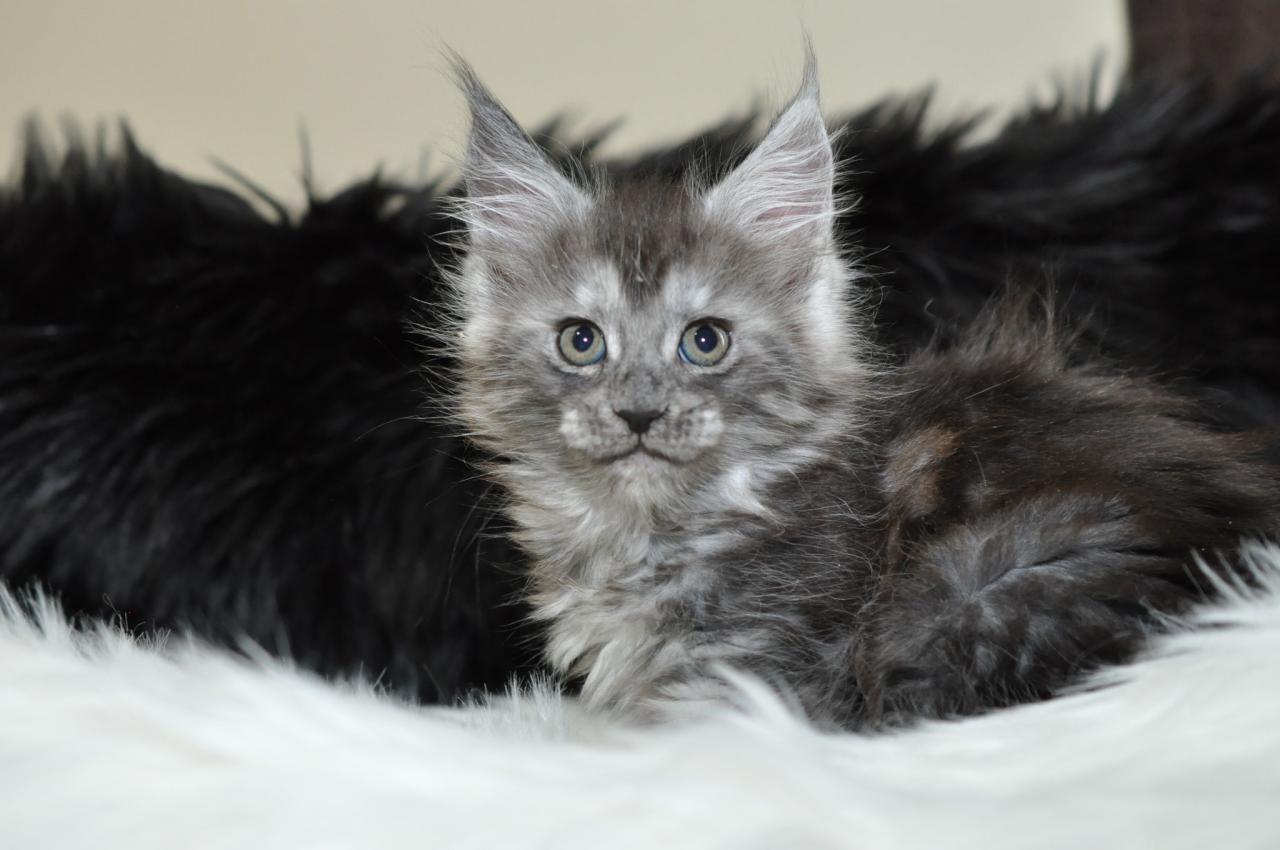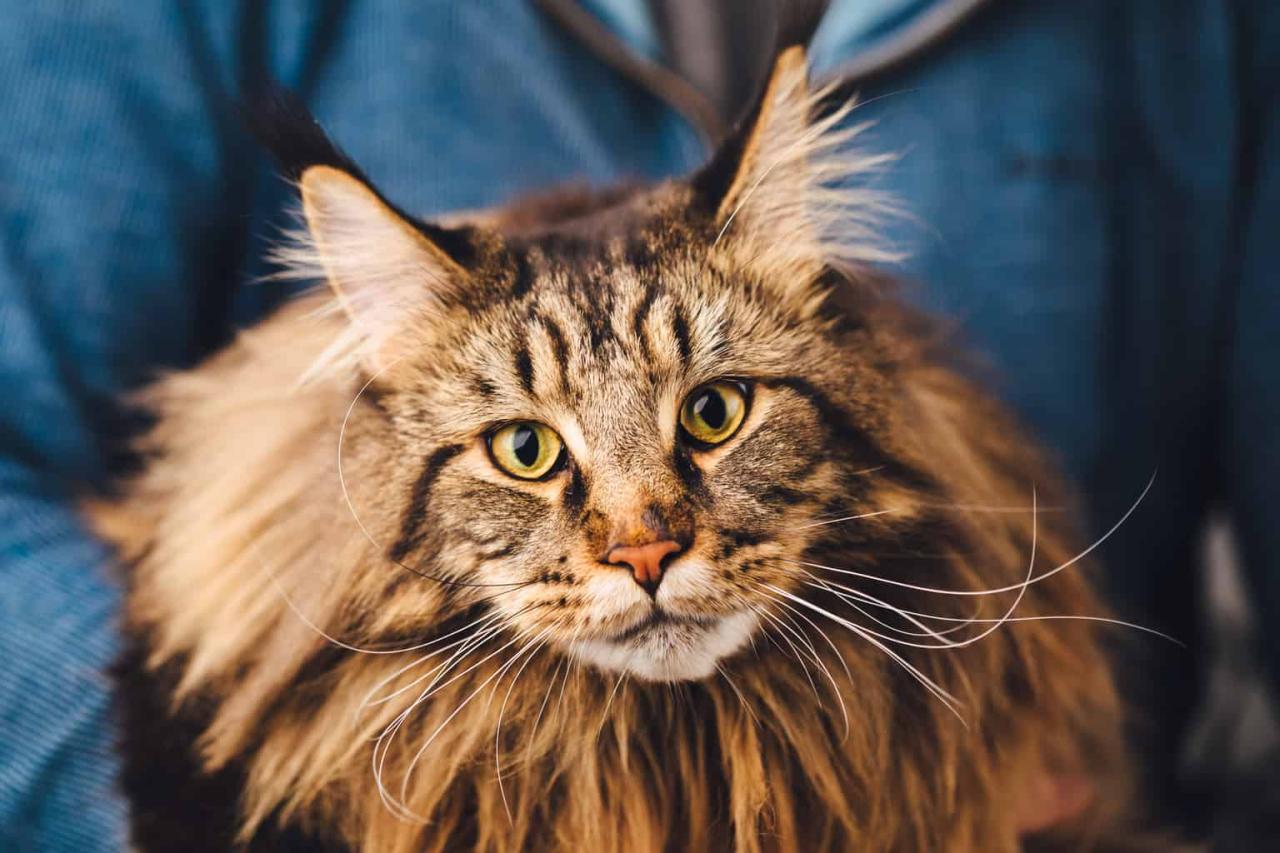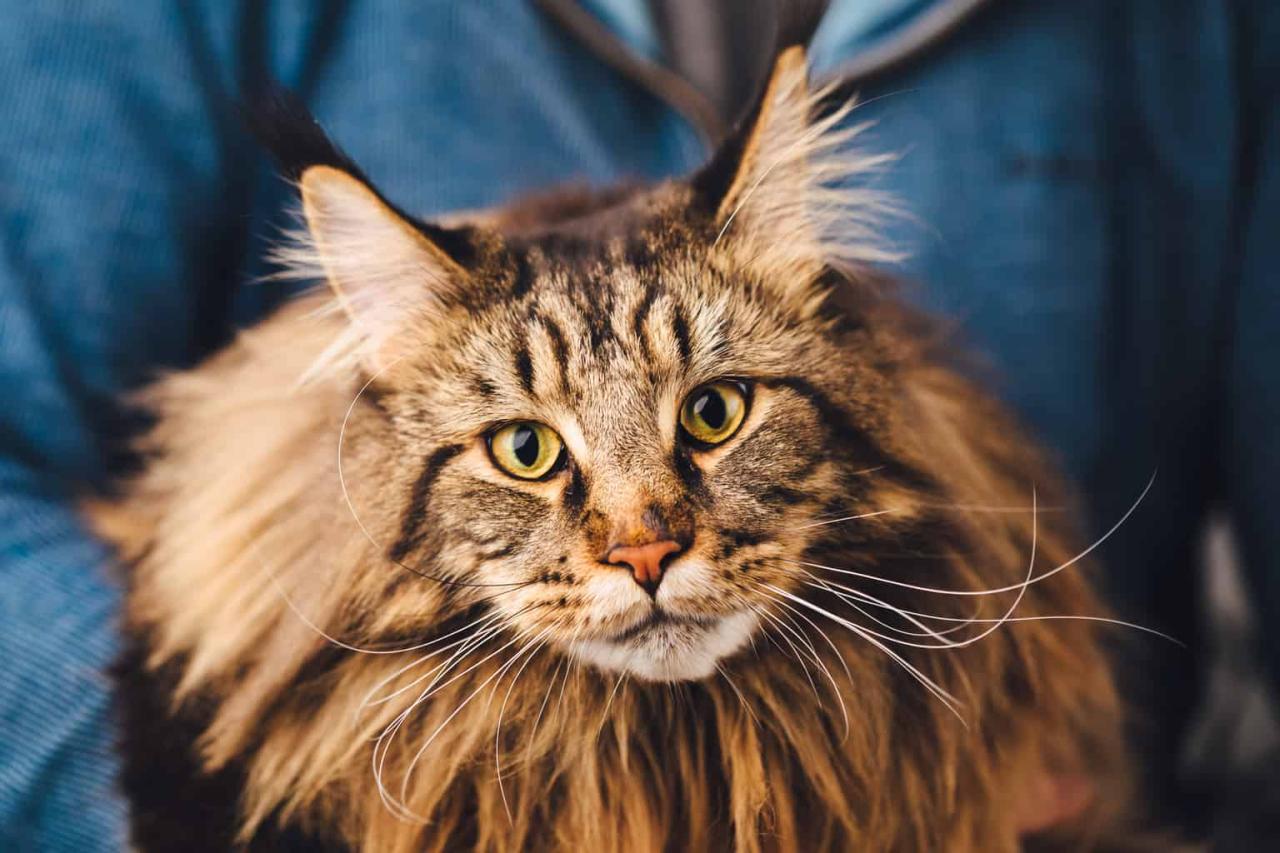Retired maine coon cats for adoption – Retired Maine Coon cats, once majestic giants of the cat world, now seek a new chapter in their lives as they enter their golden years. These gentle souls, with their distinctive personalities and unwavering affection, are ready to bring joy and companionship to loving homes.
With their striking physical traits, playful nature, and unwavering loyalty, retired Maine Coon cats offer a unique and fulfilling adoption experience. Their gentle demeanor makes them ideal companions for older adults, families with children, and those seeking emotional support.
Retired Maine Coon Cat Characteristics
Retired Maine Coon cats are a unique and lovable breed that makes excellent companions for people of all ages. They are known for their gentle and affectionate nature, as well as their impressive size and striking appearance.
Physically, retired Maine Coon cats are large and muscular, with males typically weighing between 13 and 18 pounds and females weighing between 8 and 12 pounds. They have a long, flowing coat that can come in a variety of colors and patterns, including brown tabby, black, and white.
Their eyes are large and expressive, and they have a distinctive “ruff” of fur around their neck.
In terms of personality, retired Maine Coon cats are known for being laid-back and easygoing. They are not as active as some other breeds of cats, and they are content to spend their days lounging around the house or playing with their favorite toys.
They are also very affectionate and love to be petted and cuddled.
Unique Characteristics
There are several unique characteristics that make retired Maine Coon cats particularly suitable for adoption.
- They are hypoallergenic, which means they produce less dander than other breeds of cats. This makes them a good choice for people with allergies.
- They are very intelligent and easy to train. This makes them a good choice for people who want a cat that they can teach tricks to.
- They are very adaptable and can live in a variety of different environments. This makes them a good choice for people who live in apartments or small homes.
Health Considerations for Retired Maine Coon Cats: Retired Maine Coon Cats For Adoption
As Maine Coon cats age, they may face certain health challenges that require special attention and care. Understanding these potential issues can help you provide your retired feline companion with the best possible quality of life.
The aging process can affect various aspects of a Maine Coon cat’s health, including their immune system, mobility, and organ function. Common health concerns in retired Maine Coon cats include:
Dental Disease
- Due to their long lifespans, retired Maine Coon cats may develop dental issues such as gingivitis, periodontitis, and tooth decay.
- Regular dental checkups and cleanings are crucial to maintain oral health and prevent painful dental problems.
Arthritis
- As Maine Coons age, they may experience joint pain and stiffness due to osteoarthritis, a degenerative condition that affects the cartilage in the joints.
- Supplements, pain medication, and physical therapy can help manage discomfort and improve mobility.
Heart Disease
- Older Maine Coon cats may be prone to heart conditions such as hypertrophic cardiomyopathy, a thickening of the heart muscle.
- Regular veterinary checkups and monitoring can help detect and manage heart disease early on.
Kidney Disease
- Chronic kidney disease is a common health issue in aging cats, including Maine Coons.
- Early detection and treatment, including a special diet and medication, can help slow the progression of the disease and improve the cat’s quality of life.
Hyperthyroidism
- Hyperthyroidism is a condition where the thyroid gland produces excessive hormones.
- Symptoms include increased appetite, weight loss, and hyperactivity. Treatment options include medication or radioactive iodine therapy.
Adoption Process for Retired Maine Coon Cats
Adopting a retired Maine Coon cat is a rewarding experience, but it also requires careful consideration. Here’s an overview of the adoption process and some tips to help you find the perfect match for your home.
Steps Involved in the Adoption Process
- Contact reputable organizations or shelters:Begin your search by reaching out to organizations specializing in Maine Coon cats or general cat adoption. These organizations often have retired Maine Coons available for adoption and can provide guidance throughout the process.
- Complete an adoption application:Most organizations require potential adopters to complete an application that includes questions about your lifestyle, experience with cats, and home environment. This helps them assess if you’re a suitable match for a retired Maine Coon.
- Home visit:In many cases, organizations conduct home visits to ensure your living space is safe and appropriate for a cat. They may also observe your interactions with other pets or children in the household.
- Meet and greet:Once your application is approved, you’ll have the opportunity to meet and interact with the retired Maine Coon cats available for adoption. Take your time to observe their personalities and find one that best fits your lifestyle and preferences.
- Adoption agreement:Before taking your new furry friend home, you’ll need to sign an adoption agreement outlining your responsibilities as a pet owner, including providing proper care, vaccinations, and socialization.
Matching Cats with Suitable Adopters
Matching retired Maine Coon cats with suitable adopters is crucial for ensuring their well-being and happiness. Consider the following factors:
- Energy level:Retired Maine Coons may have lower energy levels than younger cats, so it’s important to find an adopter who can provide a calm and relaxing environment.
- Health needs:Retired Maine Coons may have specific health needs due to their age or previous medical conditions. Ensure you’re prepared to provide the necessary care and follow-up appointments.
- Lifestyle:Retired Maine Coons prefer quiet and predictable environments. They thrive in homes where they can relax and receive plenty of attention.
Care and Enrichment for Retired Maine Coon Cats
Retired Maine Coon cats have unique care requirements that should be met to ensure their well-being and longevity. These cats may have reduced activity levels and specific dietary needs, and they require mental stimulation to maintain their cognitive health. Providing appropriate care and enrichment activities can help retired Maine Coon cats live happy and fulfilling lives.
Nutrition
Retired Maine Coon cats may have reduced energy requirements compared to younger cats. Their diet should be adjusted to meet their lower activity levels while still providing essential nutrients. A high-quality diet that is rich in protein and low in carbohydrates is recommended.
It is also important to monitor their weight to prevent obesity.
Grooming
Maine Coon cats have long, thick coats that require regular grooming. Even in retirement, these cats should be brushed several times a week to remove loose hair and prevent mats. Regular baths may also be necessary to keep their coats clean and healthy.
Exercise
Retired Maine Coon cats may not be as active as they once were, but they still need regular exercise to maintain their physical health. Short, gentle walks or playtime with interactive toys can help them stay active and prevent boredom.
Mental Stimulation
Mental stimulation is crucial for retired Maine Coon cats. These cats are highly intelligent and need activities that challenge their minds. Interactive toys, puzzle feeders, and catnip can provide mental stimulation and prevent boredom. It is also important to provide them with a variety of places to explore and climb, such as cat trees or window perches.
Creating a Senior-Friendly Environment
As retired Maine Coon cats enter their golden years, their needs change. Creating a senior-friendly environment can help them live comfortably and happily. This involves adapting the home to provide easy access, comfort, and safety.
Soft Bedding and Comfortable Spaces
Provide soft and supportive bedding in multiple locations throughout the home. Consider orthopedic beds or memory foam pads to provide extra comfort for aging joints. Place beds in warm and quiet areas where the cat can rest undisturbed.
Ramps and Accessibility
Install ramps or stairs to help cats navigate different levels of the home. This is especially important for cats with arthritis or mobility issues. Ensure ramps have a gentle incline and are covered with non-slip material for safety.
Hiding Places and Privacy
Provide plenty of hiding places for cats to retreat to when they feel overwhelmed or need some alone time. This could include cat trees with enclosed spaces, cardboard boxes, or cozy blankets. Respect the cat’s privacy and give them space when they seek it.
Benefits of Adopting a Retired Maine Coon Cat
Retired Maine Coon cats offer unique advantages for those seeking companionship and affection. These gentle giants bring joy and purpose to their owners, especially older adults or families looking for a low-maintenance companion.
Therapeutic Benefits of Feline Companionship
Studies have shown that interacting with cats can reduce stress, lower blood pressure, and promote relaxation. The calming presence and affectionate nature of Maine Coons can provide a sense of comfort and security, fostering a sense of well-being.
Emotional Support and Bonding

Retired Maine Coon cats are renowned for their exceptional emotional support abilities. Their gentle and affectionate nature provides a calming presence, creating a soothing and comforting environment for those in need. Whether it’s a senior seeking companionship, an individual coping with anxiety or stress, or simply someone looking for unconditional love, retired Maine Coon cats offer a profound connection.
Creating a Strong Bond
Establishing a strong bond with a retired Maine Coon cat is crucial for both the cat and its new family. Spending quality time together, engaging in affectionate interactions, and providing a safe and nurturing environment are essential for building a lasting and fulfilling relationship.
As the bond deepens, the cat becomes a cherished companion, providing emotional support, reducing loneliness, and enriching the lives of its human caregivers.
Success Stories and Testimonials

The adoption of retired Maine Coon cats has brought immense joy and companionship to numerous individuals. Here are some heartwarming stories that showcase the transformative power of adoption:
Adopting a retired Maine Coon cat can be a rewarding experience for both the cat and the adopter. These cats have often spent many years providing love and companionship to their previous owners, and they are eager to find a new home where they can continue to be loved and cared for.
A Second Chance at Love
Sarah, a retired teacher, had always wanted a Maine Coon cat, but she never had the opportunity to get one. When she saw an ad for a retired Maine Coon cat named Max, she knew she had to meet him.
Max was a gentle and loving cat who had spent his life as a cherished companion. He was overjoyed to find a new home with Sarah, and he quickly became a part of her family.
“Max has brought so much joy into my life,” Sarah said. “He is a wonderful companion, and I am so grateful to have him in my life.”
Resources for Retired Maine Coon Cat Owners
Owning a retired Maine Coon cat is a rewarding experience, but it also comes with unique responsibilities. Here are some resources to help you provide the best possible care for your feline friend:
Veterinary Care
* Establish a relationship with a veterinarian who is experienced in caring for senior cats.
- Schedule regular checkups and vaccinations to monitor your cat’s health and prevent disease.
- Be aware of common health issues in senior cats, such as arthritis, kidney disease, and dental problems.
Support Groups and Online Communities
* Join online forums and support groups dedicated to Maine Coon cats or senior cats.
Connect with other owners who can share their experiences, offer advice, and provide emotional support.
Financial Assistance and Pet Insurance
* Explore financial assistance programs that can help cover the cost of veterinary care for low-income pet owners.
- Consider pet insurance to protect against unexpected medical expenses.
- Research different insurance plans to find one that meets your needs and budget.
Additional Resources, Retired maine coon cats for adoption
* Maine Coon Breeders and Rescue Organizations: These organizations can provide information on retired Maine Coon cats available for adoption.
Cat Care Websites and Books
Access a wealth of information on cat care, including nutrition, grooming, and behavior.
Local Animal Shelters and Humane Societies
These organizations often have retired Maine Coon cats available for adoption and can provide resources for their care.By utilizing these resources, you can ensure that your retired Maine Coon cat enjoys a happy and healthy life in their golden years.
Summary
Adopting a retired Maine Coon cat is a rewarding experience that brings immeasurable joy and companionship. These gentle giants deserve a loving home where they can spend their twilight years in comfort, surrounded by those who cherish their unique qualities.
By opening your heart and home to a retired Maine Coon, you not only provide a second chance for a deserving feline but also enrich your own life with their unwavering love and affection.

